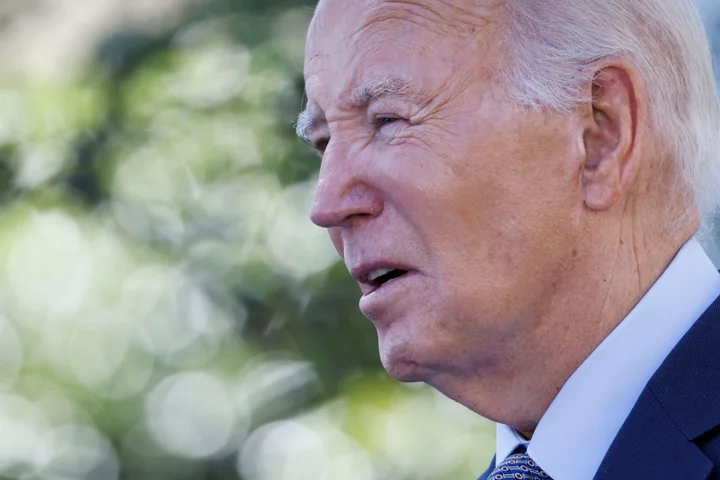A visit to Washington by the European Union’s two top officials later this week was supposed to focus on Ukraine, trade and countering China. But fears that Israel’s conflict with Hamas could turn into a wider war have injected new urgency into the summit.
European Commission President Ursula von der Leyen and European Council President Charles Michel will meet President Joe Biden in DC for a joint summit for the first time in two years. The original idea was to talk thorny trade issues linked to excess capacity and carbon emissions. But Biden is set to visit Israel on Wednesday amid the turmoil and would have to scramble back to receive the two presidents.
Von der Leyen just returned home from her own visit to meet with Prime Minister Benjamin Netanyahu. Now the EU and Biden will look to project a united front of support for Israel while also pressing Netanyahu to spare the lives of civilians as he prepares a ground assault of the Gaza Strip.
Even as Israel dominates the agenda, both sides want to address several other issues with long-term consequences. Here’s what to watch:
Tackling Russia’s Sanctions Evasion
The EU and US will reaffirm their commitment to supporting Ukraine for as long as it takes. The EU will be especially keen to keep Russia’s war of aggression high on the agenda, as other crises flare up around the world and the US enters an election season that worries some allies.
Cracking down on Moscow’s ability to get around EU and US trade restrictions on sanctioned technologies used by Russia’s war machine will be high on the agenda.
The allies will also say that they intend to act on indications that the oil price cap policy is being skirted. They will also look to make progress on plans to use profits generated by frozen Russian sovereign assets to help with Ukraine’s reconstruction.
US, EU Will Use Summit to Align Strategies on Russia, China
Trade Deals
Two key outcomes expected from the summit are a political agreement on steel and aluminum arrangements and a deal on critical minerals.
The so-called Global Arrangement on Sustainable Steel and Aluminum, or GSA, would see the EU and US tackle excess capacity and carbon emissions in the metals. The GSA would allow the two economies to avert the return of billions of dollars in Trump-era tariffs and EU retaliatory measures.
On excess capacity, the EU would launch new investigations in the coming months that could lead to new tariffs aimed at the non-market practices of economies such as China while the US could introduce new levies of its own.
The EU would implement its part of the accords aimed at dirty steel through the carbon border adjustment mechanism while the US could introduce additional tariffs and measures.
After the summit, the two allies will work toward an international agreement open to other like-minded countries.
A deal on critical minerals, meanwhile, is needed to allow European firms to access some of the benefits of the US’s Inflation Reduction Act, which includes roughly $500 billion in new spending and tax breaks over a decade mostly to benefit US companies. The EU is also hoping to iron out other irritants that it sees as inherent in several of the Biden administration’s “buy American” trade policies.
China Coordination
The US and the EU have implemented policies to limit China’s ability to acquire advanced technologies that could be used for military purposes, as well as mitigate dependency risks in their respective supply chains.
As part of these efforts, the US and EU will look to enhance cooperation on export controls, as well as inbound and outbound investments. As both allies continue to develop their economic security policies, they will be keen to avoid gaps and unintended consequences, while engaging with Beijing on foreign policy issues and matters such as climate action, as well as maintain access to each others’ markets.
That won’t be easy. Several EU member states have a softer approach to China compared with the US and there are some concerns that Beijing could retaliate against any measures Washington and Brussels introduce.
An EU anti-subsidies investigation into electric vehicles made in China, which could also target Tesla Inc., may also come up in the leaders’ discussions.
Ramping Up Efforts to Fight Misinformation
Another summit deliverable will be expanded collaboration on disinformation.
The US and EU will do this “based on a shared framework with common principles, including by capacity building to support like-minded partners in countering foreign information manipulation and interference, together with partner countries,” according to a draft statement.
The issue has come to the fore with the Israel-Hamas war, with several reports of misinformation on platforms such as X. The EU opened an investigation into the Elon Musk-owned social media site earlier this month.
Read More: Israel-Hamas Conflict Was a Test for Musk’s X, and It Failed
The Israel-Hamas War
The Oct. 7 attack against Israel and its war with Hamas will feature prominently. Transatlantic allies are providing Israel with strong backing to protect its citizens while looking to avoid an escalation into a wider regional conflict.
A draft summit statement seen by Bloomberg says that the US and EU also “stand ready to continue supporting civilian population in Gaza in coordination with partners.”
It is unclear if the summit discussions will deliver lead to further directives or actions beyond a unified statement of support.
(Updates with Biden trip to Israel)
Author: Alberto Nardelli, Jennifer Jacobs and Jorge Valero

